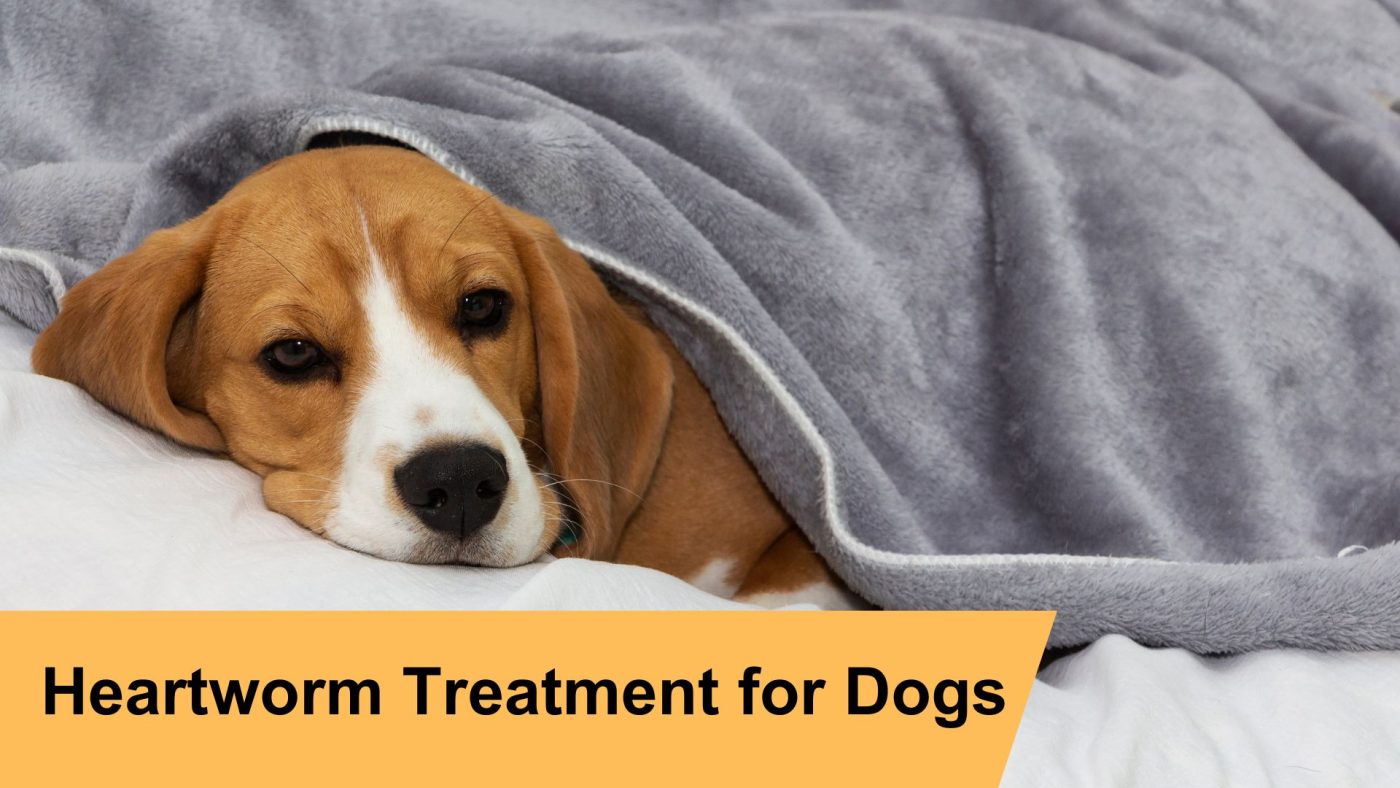Heartworm disease is a severe and potentially fatal condition that affects dogs. It is caused by a parasitic roundworm known as Dirofilaria immitis, transmitted most dogs through infected mosquito that bites.
Once inside the infected dog’s bloodstream, the immature heartworms can grow and migrate to the heart and lungs of infected dog, where they mature into adult worms that can cause severe lung disease and heart failure. It’s important to note that heartworm disease doesn’t only affect dogs – cats can also become infected.
However, since cats are not a natural host for the parasite, they are less susceptible to infection than dogs. Still, cat owners need to discuss prevention options with their veterinarians.
Importance of Heartworm Treatment for Dogs

If left untreated, heartworm disease can be fatal for dogs. That’s why it’s crucial to seek treatment as soon as possible if your pet has been diagnosed with the condition.
Even with successful treatment, most post-treatment complications occur when infected dogs are not treated properly, or exercise restriction after treatment is not followed. Heartworm preventives are an effective way to help protect your dog from this debilitating disease.
Consistent use of preventative medication can ensure that your pet stays healthy and free from infestations that could cause severe damage to their health over time. It’s always best to consult your veterinarian on which preventive measure is right for you and your pet’s health before starting any medication regimen.
Can Dogs Have Heartworm Treatment?
Yes, dogs can receive heartworm treatment

Heartworm disease is a severe and potentially fatal condition that affects dogs of all ages, breeds, and sizes. Luckily, several heartworm treatment options are available for dogs that have already been infected. If your dog has tested positive for heartworms or you suspect they may be infected, it’s essential to seek veterinary care immediately.
While some dog owners may be hesitant to pursue treatment due to concerns about the safety and efficacy of medicines on their dog’s body, it is essential to know that heartworm disease, left untreated, can cause severe organ damage and even sudden death in some cases. Therefore, seeking proper treatment for your dog is crucial for their health and well-being.
Different types of heartworm treatments available for dogs
Several types of heartworm treatments are available for dogs depending on the heartworm disease treated the severity of the infection and the dog’s overall condition. The most common type of treatment involves medication to kill the adult heartworms inside a dog’s body. This can be achieved through injections pain medication such as melarsomine dihydrochloride or with medications containing ivermectin or milbemycin oxime.
In addition to killing adult worms, it is also necessary to kill juvenile heartworms before they mature into adults and produce offspring. This can be done with doxycycline or other ivermectin-based medications specifically designed to kill microfilariae – baby heartworms.
It’s important to note that, like any medical procedure or medication, there are potential side effects associated with each type of treatment. However, if your veterinarian recommends a specific course of action and your dog is treated properly, many cases result in successful treatment outcomes without most post-treatment complications.
Heartworm Treatment Options for Dogs
Medications to kill adult heartworms

If your dog has been diagnosed with heartworm disease, several medications are available that your veterinarian may recommend to kill adult heartworms. The most common injectable drug used for this purpose is melarsomine dihydrochloride, administered in several injections over several months. This treatment can be effective for dogs with severe heartworm disease, but it can also be potentially toxic and require close monitoring by a veterinarian.
Alternatively, oral medications can be administered to kill adult heartworms. These medications include ivermectin-based and milbemycin oxime-based treatments.
Ivermectin-based treatments come in monthly chewable tablets or as an injectable solution from a veterinarian. Milbemycin oxime-based treatments are also given orally as a tablet or chewable treat.
Medications to kill microfilariae (baby heartworms)
In addition to killing adult heartworms, it’s essential to eliminate any baby heartworms (microfilariae) present in your dog’s bloodstream. This process is typically accomplished through the use of doxycycline, an antibiotic medication that helps eliminate the bacteria Wolbachia from within the parasitic worms. When Wolbachia dies off, so do many of the microfilariae.
Ivermectin-based medications can also help eliminate microfilariae when given at higher doses than those used for monthly heartworm prevention. However, it’s important to note that giving high doses of ivermectin can put some breeds at risk for adverse reactions such as sensitivity to certain drugs or trouble breathing.
Overall, treatment for heartworm disease should be carefully tailored to your dog’s specific needs and the severity of the infection. Your veterinarian may recommend a combination of medications to ensure that the heartworms are effectively eliminated from your dog’s system.
Heartworm Prevention: The Best Treatment

While there are effective treatments for heartworm disease, prevention is always the best course of action. Regular heartworm tests and monthly heartworm preventive medication can help protect your dog from this potentially fatal disease.
According to the American Heartworm Society, dogs over six months old should be tested for heartworms annually and treated with a preventive medication year-round. If your dog has already been diagnosed with heartworm disease, don’t despair.
Dogs can successfully recover from this condition with proper treatment and close monitoring by a veterinarian. As always, discussing any concerns or questions you or other dogs may have about heartworm treatment options with your trusted veterinarian is important.
Risks and Side Effects of Heartworm Treatment in Dogs
Allergic reactions to medication
While heartworm treatment is necessary to rid your dog of the disease, it is not without risks. One risk most dogs face during treatment is an allergic reaction to the medication.
Symptoms may include difficulty breathing, swelling of the face, tongue, or throat, hives, and vomiting. Serious complications such as shock or organ damage can occur in rare cases.
If you notice any signs of an allergic reaction in your dog after beginning heartworm treatment, it’s important to contact your veterinarian immediately. They may prescribe oral prednisone or other medications to help manage the reaction and prevent further complications.
Pain and swelling at the injection site

Another common side effect of dog heartworm treatment is pain and swelling at the injection site. This is particularly true for treatments that involve a melarsomine dihydrochloride injection. While this pain can be managed with pain relievers prescribed by your veterinarian, monitoring your dog’s condition following treatment closely is essential.
In some cases, dogs may experience severe reactions to heartworm larvae such as blood vessel damage or difficulty breathing due to pulmonary thromboembolism (a blockage in a blood vessel). If you notice any concerning symptoms after your dog has received heartworm treatment, don’t hesitate to contact your vet.
Lethargy and loss of appetite
Dogs may experience lethargy and loss of appetite following heartworm treatment. This is normal as their body works hard to rid itself of immature worms and recover from the damage caused by advanced heartworm disease. During this period following treatment (typically ranging from 4-6 weeks), keeping your dog on cage rest with no running or jumping activities allowed is essential.
Additional follow-up visits with veterinarians, including additional testing such as confirmatory tests, chest x-rays, ECGs, and heartworm antigen tests, may be necessary to assess the dog’s condition and determine if further treatment is required. Ask your veterinarian about heartworm preventives that can help prevent future infections so you don’t have to repeat this complex process.
Preparing Your Dog for Heartworm Treatment
Pre-treatment testing and evaluation by a veterinarian

When it comes to heartworm treatment, the first step is always pre-treatment testing and evaluation by a veterinarian. This is a crucial step because among other tests, it helps the vet determine the severity of your dog’s heartworm infection. During this stage, your dog will undergo several tests to evaluate its heartworm preventative overall health and help develop an appropriate treatment plan.
Blood tests to determine the severity of infection
The first heartworm test performed will likely be a blood test. This test checks for adult heartworms in associated blood vessels your dog’s body.
It also measures the number of microfilariae or baby heartworms in their bloodstream. Knowing how many adult worms are present is important because it can determine which medication is needed and how long treatment preventing heartworms may last.
Chest x-rays to assess lung function
Chest x-rays are taken next to assess lung function after positive test results come back. The x-ray helps evaluate any damage caused by heartworm infections, such as severe lung disease or any other organ damage that could be causing health complications elsewhere in your dog’s body.
ECG (electrocardiogram) to evaluate the dog’s heart function
An ECG or electrocardiogram might be done during pre-treatment testing and evaluation to understand how well your dog’s heart is functioning. It checks for abnormalities in one dog or heartbeat rhythm that may indicate potential problems caused by adult heartworms living within blood vessels close to the heart.
Following the veterinarian’s instructions on pre-treatment care
Before starting any treatment, carefully follow your veterinarian’s instructions on pre-treatment care guidelines. This might include cage rest, exercise restriction, oral prednisone medication, or other activities your dog cannot do during treatment. Following these instructions reduces the risk of severe complications and helps prevent any potential toxic side effects from medication.
Remember, treating a heartworm-positive dog is a complex process that requires careful planning and regular follow-up care visits with your veterinarian. Taking the necessary precautions before starting treatment can significantly improve your dog’s chances of survival and recovery after heartworm treatment.
Caring for Your Dog After Heartworm Treatment
Restricted activity level during the recovery period
After a successful heartworm treatment, the dog’s body needs time to heal and recover. One of the essential aspects of post-treatment care is limiting your dog’s activity.
Dog owners should avoid letting their pets run or jump around since strenuous physical activities could damage the blood vessels in their lungs, leading to life-threatening complications. A good rule to follow is to keep your dog on a leash at all times and have them take short walks outside while avoiding any playtime or roughhousing.
No running or jumping
During recovery from heartworm treatment, it is important not to over-exert your dog. Topical medications or injections typically kill immature worms, but if many adult worms are present before treatment, they may cause additional stress on your pet’s already weakened heart. Your veterinarian will provide specific instructions regarding how much exercise your pet can handle after treatment based on their health status and response.
Follow-up visits with a veterinarian after treatment
They are following up with the vet after heartworm treatment is essential for monitoring the pet’s health and ensuring that they are adequately and successfully treated. The first follow-up appointment may include an antigen test that detects molecular markers associated with adult heartworms in the bloodstream. If negative, this suggests successful treatment; however, if positive, it indicates that some worms remain in circulation.
The vet may also check for any side effects, such as soreness or swelling at the injection site caused by melarsomine injection. Any issues related to intestinal worms should also be addressed since dogs can become re-infected with other parasites following a heartworm infection.
Caring for a dog after receiving heartworm treatment requires patience and vigilance from pet owners. By following all the vet’s instructions carefully, you can ensure that your dog remains healthy and heartworm-free.
Conclusion: Importance of Preventative Measures Against Heartworm Disease
Prevention is Key
The most important thing to remember about heartworm disease is that prevention is the best defense. It’s much easier and less expensive to prevent heartworm infection than it is to treat advanced cases. The American Heartworm Society recommends year-round heartworm prevention for all dogs, regardless of where they live or their indoor/outdoor status.
Prevention can come in monthly oral tablets, topical treatments, or injectable medications. Your veterinarian can recommend the best option based on your dog’s lifestyle and needs.
Treating Heartworm Disease Can Be Difficult
While it’s possible to treat a dog with heartworm disease successfully, it’s not an easy process. In severe cases, treatment can take months and require multiple melarsomine injections, which can be painful and many dogs require strict cage rest during recovery.
Additionally, there are risks associated with treating heartworm disease, such as allergic reactions to medication or complications from killing juvenile heartworms. It’s much better to avoid this altogether through prevention.
A Brighter Future for Dogs with Heartworm Disease
Fortunately, advances in veterinary medicine are making it easier to detect and treat heartworm disease in dogs. Confirmatory tests before starting treatment ensure that dogs are not put through unnecessary procedures if they don’t have an active infection. Pain medication and other supportive care measures help make a recovery more comfortable for dogs undergoing treatment.
Many dogs with heartworm disease can fully recover with proper care and adherence to treatment protocols. Remember that your veterinarian is your partner in both heartworm prevention and ensuring your dog stays healthy.
Regular check-ups and preventative care measures like annual heartworm testing and monthly preventive medication will go a long way toward keeping your furry friend safe from this potentially deadly disease. Take the necessary steps to protect your dog from heartworm infection, and enjoy a happier and healthier life together.
Frequently Asked Questions
Is it possible to fully eliminate heartworm infection in dogs?
Heartworm disease in dogs can be treated, but it depends on the severity of the infection. In some cases, complete elimination of heartworms is possible with appropriate treatment.
What is the survival rate for dogs undergoing heartworm treatment?
The survival rate for dogs undergoing heartworm treatment is generally high. However, it can vary depending on factors such as the disease stage and the dog’s overall health.
What are the consequences of administering heartworm prevention to a dog already infected with heartworms?
Giving heartworm prevention to a dog already infected with heartworms can lead to severe complications. It is crucial to have the dog properly diagnosed and treated by a veterinarian before starting any preventive medication.
Are there any home remedies to eliminate heartworms in dogs without veterinary intervention?
It is not recommended to attempt to get rid of heartworms in a dog without veterinary assistance. Effective treatment requires specialized medications and proper management, which a veterinarian should provide to ensure the best possible outcome for the dog.





